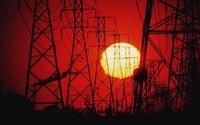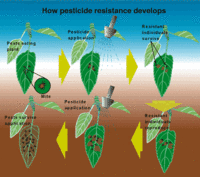-
50-state roadmap to renewable energy unveiled
Researchers recently developed detailed plans to transform the energy infrastructure of New York, California, and Washington states from fossil fuels to 100 percent renewable resources by 2050. The new roadmap to renewable energy for all fifty states was presented on 15 February at the annual meeting of the American Association for the Advancement of Science (AAAS) in Chicago. The online interactive roadmap is tailored to maximize the resource potential of each state.
-
-
Iran-Russia oil deal threatens nuclear negotiations
Iran said that in exchange for Iranian oil, Russia could build a second reactor at Iran’s Bushehr nuclear power plant. Russia could also provide Iran with trucks, railroad tracks, mini-refineries, grain, and other goods for Iranian oil. In a deal worth $1.5 billion a month, Iran would export 500,000 barrels of oil per day to Russia. The deal would increase Iran’s oil exports, which have been reduced to about one million barrels a day by American and European sanctions aimed at curbing Iran’s nuclear program.
-
-
Secure Communities triggers deportation of undocumented immigrants with no criminal records
The U.S. Immigration and Customs Enforcement’s (ICE) Secure Communitiesprogram sends fingerprint data from local law enforcement and the Federal Bureau of Investigationto immigration officers to identify and deport illegal immigrants who commit major crimes. The program has expanded from fourteen jurisdictions in 2008 to more than 3,000 today. Immigration advocates say that the program’s emphasis on identifying and deporting undocumented immigrants who have committed crimes in the United States notwithstanding, it has also triggered the deportation of 5,964 undocumented immigrants with no criminal records.
-
-
QR codes threaten Internet security
Internet security experts have raised concerns about the growing use of Quick Response codes, also known as QR codes. Because the codes can only be read by a machine, such as a smart phone, it is difficult for people to determine what they are about to download. The codes, which are often used in marketing campaigns, could also be used to subscribe people to unwanted services, such as premium SMS.
-
-
Researchers tackle rare Earth materials shortage
The demand for rare Earth materials is growing much faster than production. Rare Earth metals do occur in the earth’s crust, but not in sufficiently high concentrations. This is why only one country — China — has so far been supplying the entire world with these elements. In recent years, however, China has begun to restrict its export of these materials. European research organizations have teamed up to address growing rare Earth materials by examining a more focused approach to recycling scrap.
-
-
Lockheed Martin launches updated, expanded Engineers in the Classroom (EITC) toolkit
This week is National Engineers Week, and Lockheed Martin, a company which employs 60,000 of them, is marking the week by launching an updated and expanded Engineers in the Classroom (EITC) toolkit created in partnership with National Geographic. These materials, which can be found on Lockheed Martin’s EITC Web site, will help engineers and scientists engage students in hands-on, creative activities with a goal of inspiring them to consider careers in STEM.
-
-
Skeptics doubt voluntary Cybersecurity Framework will achieve its goal
The Framework for Improving Critical Infrastructure Cybersecurity, developedby NIST following Executive Order 13636to promote cybersecurity, has been received with both support and skepticism from critical infrastructure industries. The 41-page document, put together by industry and government experts, offers guidelines on cybersecurity standards and best practices to critical infrastructure firms. It says its role is to be a complement to industries’ existing risk management practices.Skepticssay that without incentives, legislation, or enforcement, the guidelines will not be adopted.”The marketplace will punish any company that implements anything that could be considered excessive security, because it will increase their costs,” says an industry insider.
-
-
Power cuts will be more common in the future

U.S. figures show that since 2007, commercial and domestic air-conditioning alone consumed 484billion kilowatt hours of electricity — not much more than the country’s total energy consumption in the mid-1950s. The American Society of Civil Engineers (ASCE) has warned that U.S. generation systems could collapse by 2020 without $100 billion of new investment in power stations. Demands of high-powered electrical appliances, a growing world population, and inadequate investment in the power sector will create more frequent power blackouts in Western societies.
-
-
Resistance shapes the discovery of new insecticides

Recent news around the world has focused on the dangers of antibiotic resistance. – and the CDC estimates over two-million illnesses and 23,000 deaths occurred in 2013 as a result of antibiotic resistance in bacteria and fungus. But what of another type of resistance which can also have a huge impact on the population: that to insecticides? Livestock, for example, are affected by buffalo flies; farmers and customers are familiar with the total devastation caused by fruit flies; malaria mosquitoes and bed bugs are becoming more resistant to existing chemicals. Even our pets are affected: fleas and ticks are continuing their march, leading to a need for newer, often more expensive synthetic chemistries. The price of insecticide resistance — in the form of R&D costs for new compounds — is passed from chemical companies, to farmers, to consumers.
-
-
Cuba to lose its U.S. banking service today
Today (Monday) Cuba’s bank in the United States, Buffalo-based M&T Bank, will stop accepting Cuba’s deposits. The bank will close Cuba’s accounts on 1 March 2014. One result will be that travel between Cuba and the United States will become more difficult because banking services are necessary for issuing travel visas. Cuba’s diplomatic mission in Washington, D.C., and the Cuban Permanent Mission to the United Nations in New York have been unable to find an American bank to handle the country’s U.S.-based accounts.
-
-
The entertainment industry understands the rare Earth crisis, why doesn’t everybody else?
U.S. dependence on rare earths imports substantially exceeds our dependence on imported petroleum. In 2011, the United States imported 45 percent of the petroleum we consumed, but we imported 100 percent of the rare earth materials we consumed that same year — and rare earths are far more essential to a wider variety of industries than petroleum is. China controls the production, refining, and processing of over 95 percent of the world’s rare earth elements despite only controlling about half of the world’s rare earth resources. In the 1980s, there were approximately 25,000 American rare earth-related jobs; now we barely have 1,500. The United States must take action now to reduce our dependence on foreign sources of rare earth materials and bring back jobs.
-
-
German IT industry hopes to benefit from NSA leaks-inspired distrust of U.S. tech companies
The German IT sector is hoping to benefit from trust lost in American technology firms in the aftermath of Edward Snowden’s leaks. The German government is looking to develop Internet security initiatives, with government departments vying with each other for a lead role. Both inside and outside the German government a proposal, known as “Schengen Routing,” is advanced which calls for data originated in Europe to be processed and stored within Europe. Critics warn that plans to create a European routing system could affect the openness of the Internet.
-
-
Israeli defense company launches cybersecurity solutions section
In recent months the Israel Aerospace Industries (IAI) has increased its cyberdefense-related activities. Esti Peshin, director of the company’s cyber section and a veteran of the IDF’s hush-hush sigint Unit 8200, says IAI is now developing solutions for clients in Israel and abroad. “We’re a start-up, but with the backing of a company that earns $3.5 billion a year,” she said. Ultimately, she implied, these defensive measures can be turned into offensive capabilities. “Intelligence is a subset of attack,” Peshin said. “This is, first of all, a national mission.”
-
-
Research on bacteria-invading virus to help the agriculture community

Innovative work by two Florida State University scientists shows the structural and DNA breakdown of a bacteria-invading virus. This type of virus is called a bacteriophage, and the deconstruction of its DNA could be particularly useful for the agriculture community and seed companies. Important crop plants depend on biological nitrogen fixation by the bacteria which is preyed upon by this phage. Nitrogen fixation is the process by which abundant nitrogen gas in the atmosphere is converted to the scarce soil resources ammonia and nitrate.
-
-
Micro-windmills to recharge cell phones, used for home energy generation
Researchers have designed a micro-windmill that generates wind energy and may become an innovative solution to cell phone batteries constantly in need of recharging, and home energy generation where large windmills are not preferred. The device is about 1.8 mm at its widest point. A single grain of rice could hold about ten of these tiny windmills. Hundreds of the windmills could be embedded in a sleeve for a cell phone.
-
More headlines
The long view
Ransomware Attacks: Death Threats, Endangered Patients and Millions of Dollars in Damages
A ransomware attack on Change Healthcare, a company that processes 15 billion health care transactions annually and deals with 1 in 3 patient records in the United States, is continuing to cause massive disruptions nearly three weeks later. The incident, which started on February 21, has been called the “most significant cyberattack on the U.S. health care system” by the American Hospital Association. It is just the latest example of an increasing trend.
Chinese Government Hackers Targeted Critics of China, U.S. Businesses and Politicians
An indictment was unsealed Monday charging seven nationals of the People’s Republic of China (PRC) with conspiracy to commit computer intrusions and conspiracy to commit wire fraud for their involvement in a PRC-based hacking group that spent approximately 14 years targeting U.S. and foreign critics, businesses, and political officials in furtherance of the PRC’s economic espionage and foreign intelligence objectives.
European Arms Imports Nearly Double, U.S. and French Exports Rise, and Russian Exports Fall Sharply
States in Europe almost doubled their imports of major arms (+94 per cent) between 2014–18 and 2019–23. The United States increased its arms exports by 17 per cent between 2014–18 and 2019–23, while Russia’s arms exports halved. Russia was for the first time the third largest arms exporter, falling just behind France.
LNG Exports Have Had No Impact on Domestic Energy Costs: Analysis
U.S. liquified natural gas (LNG) exports have not had any sustained and significant direct impact on U.S. natural gas prices and have, in fact, spurred production and productivity gains, which contribute to downward pressure on domestic prices.
